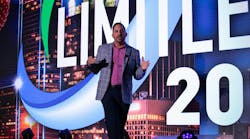Jumpstarting Careers
It’s no secret that in recent years shops have had to grapple with struggling to find talent for their businesses. As the need for emerging technicians grows, automotive school programs have become more common nationwide to prepare and encourage those entering the workforce to pursue a career in fields such as collision repair.
One of the most recent of these programs is in Huntsville, North Carolina, at Aspire Trade High School. The school offers training for high school students in different trades, such as carpentry and HVAC, and is now opening a collision education center with the help of Absolute Collision Center and IDS Automotive.
Absolute Collision owner Thomas Goforth sat down with FenderBender to talk about the program his company is helping start and what it means for shops.
Aspire Trade High School and Absolute Collision decided to work together to create the program after contacting a member of the school’s board of directors, Jennifer Nichols. Absolute Collision’s corporate office is in Cornelius, North Carolina, about 10 minutes from the school’s campus.
With the program slated to begin in the fall semester later this year, a curriculum and the process of selecting an instructor were still in development at the time of this reporting. A body shop for students to perform hands-on work was also being planned. It’s estimated to be around 1,400 to 1,600 square feet in size when it’s completed.
When students first enter the program, the first semester will focus on giving them a foundational understanding of the automotive field, touching on topics including estimatics, ordering parts, body paint, mechanical work and ADAS. From there, as students progress through the program, they can understand what they would like to pursue as a specialization.
“Whatever they gravitate towards in that freshman year, they're going to kind of go from the sophomore to senior year more in-depth–whether it be estimating and parts, whether it's paint and body, whether it's mechanical and ADAS,” Goforth says.
The shop provided for students will allow them to perform a variety of work throughout the process of car restoration. It will come equipped with a paint booth, a frame machine for calibration, and computers for ordering parts and creating estimates.
“The students [that are] interested in the parts, in estimating handle that, then it goes into paint and body, then it goes into the mechanical and the ADAS, and they actually see a working car getting repaired through the model,” Goforth explains.
As the students reach their junior and senior years in the program, they can do summer internships. Students that complete the program can earn different I-CAR and ASE certifications, depending on their focus.
The goal of the program is for students to be able to come out of high school already equipped with valuable skills that they’re ready to use. Absolute Collision is committed to bringing on as many graduates onto its team as possible and will help any that they cannot hire to connect with dealerships, independent shops, and regional MSOs needing help.
Aspire’s new program already has a waitlist for the coming semester, and as more programs such as these crop up around the country, the earlier shops make themselves known to students in the community, the better chance they have of attracting them after they graduate.
“Actually getting in front of these schools and guidance counselors and principals, and, you know, let them know it exists before their 12th-grade year when ... they're out of time and have to make a decision starting early, I think is the biggest thing,” Goforth says.
Shops can do this by becoming involved with the community and showing support to trade and charter schools, such as Absolute Collision inviting 8th-grade students to tour its shop. While good for brand promotion, it also keeps that business at the forefront of students' minds as they grow and consider career options.
A shortage of available help has been a problem in nearly every trade, but Goforth believes that Absolute Collision and Aspire are helping to show students that they can have a fulfilling career that provides for them through the automotive industry.
“Our reasoning behind this is to, you know–and I've always said it and the team believes it–to leave the industry better than we found it,” Goforth remarks. “So, you know, I think this is going to be something that's been much needed in the industry. That's, you know, today's technologies, today's trends, and the soft skills and the hard skills that are needed in today's workforce.”



